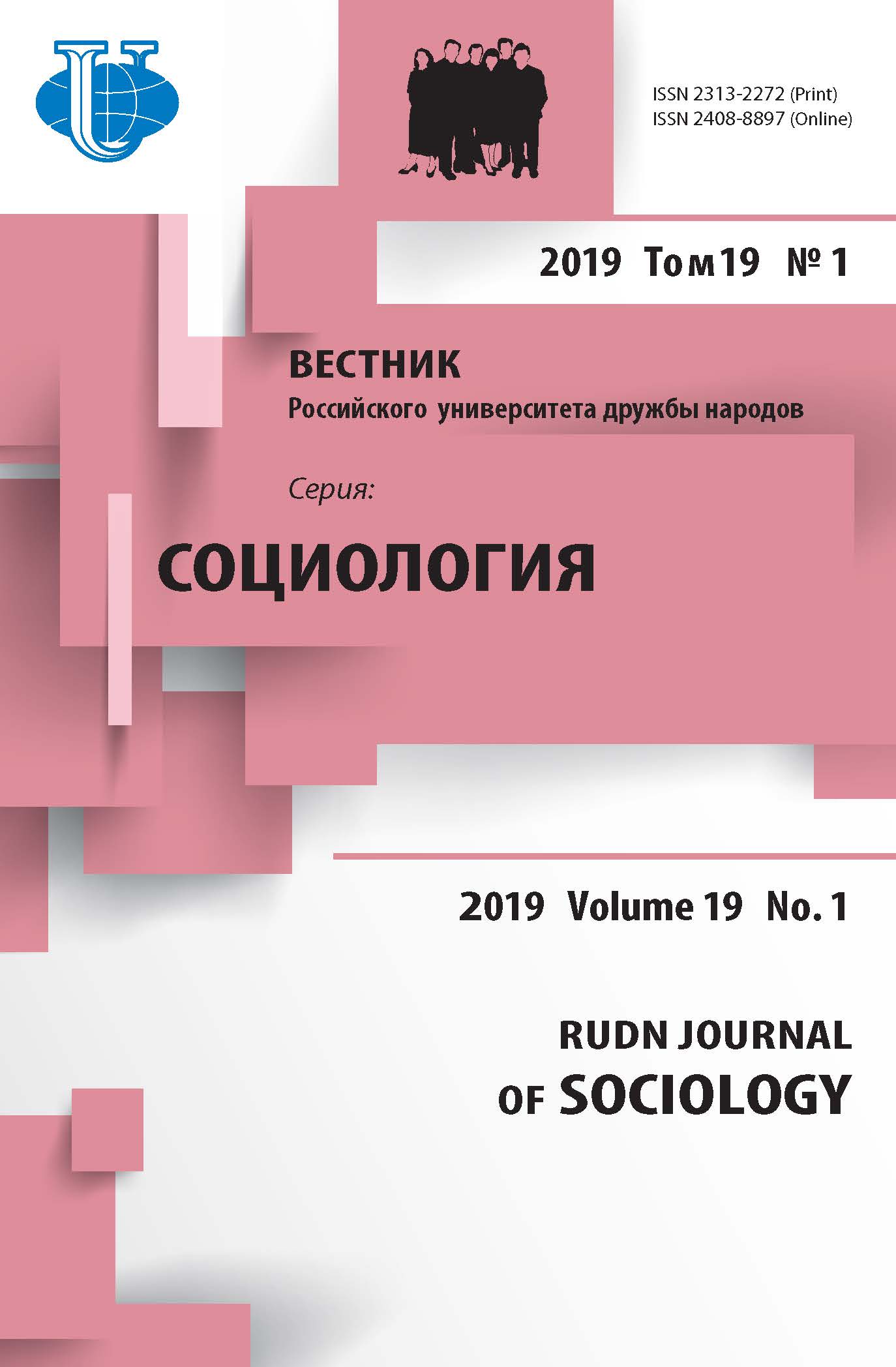Lower social class in traditional and modern societies
- Authors: Popov MY.1, Kapishin AE2
-
Affiliations:
- Kuban State University
- RUDN University (Peoples’ Friendship University of Russia)
- Issue: Vol 19, No 1 (2019)
- Pages: 94-107
- Section: Sociological lectures
- URL: https://journals.rudn.ru/sociology/article/view/20559
- DOI: https://doi.org/10.22363/2313-2272-2019-19-1-94-107
Cite item
Full Text
Abstract
The authors make a distinction between such concepts as ‘lower social class’ (‘lumpen-proletariat’), ‘criminal community’ and ‘cultural underground’, and identify significant differences between the lower social strata in traditional and modern societies. The single ‘lower social world’ of traditional societies had its own cults, culture and organization and was an opposite of the ‘upper social world’. The religious definition of its ritual impurity was the basis for discrimination and segregation of its members and social groups. In modern societies, the lower class disintegrates and cannot be considered a single social anti-system: its ‘fragments’ - the prison part of the criminal community, counter-cultural underground and forbidden sects - are not connected with each other; the upper privileged part of criminal communities (a system of patronages with horizontal and vertical social ties) became a part of the modern society elite. At the same time, the system of patron-client relations that invisibly permeates modern societies necessarily implies corruption, at least the ‘soft corruption’. The authors consider such a phenomenon as an ‘underground’ in modern societies defining it as countercultural groups consisting mainly of well-educated representatives of the middle-class. The article also describes the underground of the Soviet society before and after perestroika which cannot be defined as a lower class of the contemporary Russian society. In conclusion, the authors suggest that in the Russian culture there is a kind of refined image of the ‘social bottom’ that influenced scientific ideas about it and is based on the social representations of the lower social class in the traditional society.
About the authors
M Yu Popov
Kuban State University
Author for correspondence.
Email: popov-52@mail.ru
доктор социологических наук, главный редактор журнала «Гуманитарные, социально-экономические и общественные науки»
mcr. im. G. Zhukova, PO box 1812, Krasnodar, Russia, 350005A E Kapishin
RUDN University (Peoples’ Friendship University of Russia)
Email: poliarnik@yandex.ru
кандидат философских наук, старший преподаватель кафедры социологии Российского университета дружбы народов
Miklukho-Maklaya St., 6, Moscow, Russia, 117198References
- Aristotle. Sochineniya [Works]. Vol. 4. Moscow; 1984 (In Russ.).
- Afanasiev M.N. Klientelizm i rossiyskaya gosudarstvennost [Clientelism and Russian Statehood]. Moscow; 2000 (In Russ.).
- Bachinin V.A. “Chelovek barachny” v poeticheskoy deviantografii Igorya Kholina [The ‘barrack man’ in the poetic deviantography of Igor Kholin]. http://hpsy.ru/public/x5044.htm (In Russ.).
- Bachinin V.A. Osnovy sotsiologii prava i prestupnosti [Foundations of Sociology of Law and Crime]. Moscow; 2001 (In Russ.).
- Dunn C.J. Traditsionnaya Yaponiya [Everyday Life in Traditional Japan]. Moscow; 2006 (In Russ.).
- Douglas M. Chistota i opasnost. Analiz predstavleniy ob oskvernenii i tabu [Purity and Danger: An Analysis of the Concepts of Pollution and Taboo]. Moscow; 2000 (In Russ.).
- Mills C.W. Sotsiologicheskoe voobrazhenie [Sociological Imagination]. Moscow; 2001 (In Russ.).
- Mikhaylin V.Yu. Tropa zverinykh slov [The Path of Animal Words]. Moscow; 2005 (In Russ.).
- Robinson J. Vsemirnaya prachechnaya. Terror, prestupleniya i gryaznye dengi v ofshornom mire [The Sink: Terror, Crime and Dirty Money in the Offshore World]. Moscow; 2004 (In Russ.).
- Scott J. Iskusstvo byt nepodvlastnym: Anarkhicheskaya istoriya vysokogoriy Yugo-Vostochnoy Azii [The Art of Not Being Governed: An Anarchist History of Upland Southeast Asia]. Per. s angl. I.V. Trotsuk. Moscow; 2017 (In Russ.).
- Sulakshin S.S., Maksimov S.V., Akhmetzyanova I.R. i dr. Gosudarstvennaya politika protivodeystviya korruptsii i tenevoy ekonomike v Rossii [Government Policy to Counter Corruption and the Shadow Economy in Russia]. Vol. 1. Moscow; 2008.
- Trotsuk I.V. Begstvo ot gosudarstva: soznatelny otkaz ot “dostizheniy tsivilizatsii” i strategii podderzhaniya “varvarskogo sostoyaniya” [Flight from the state: A conscious rejection of the ‘achievements of civilization’ and a strategy to maintain the ‘barbarity’]. Sotsiologiya Vlasti. 2012; 4 (In Russ.).
- Warner L. Sotsialny klass i sotsialnaya struktura [Social class and social structure]. Rubezh. 1999; 10—11 (In Russ.).
- Uspenskaya E.N. Antropologiya indiyskoy kasty [Anthropology of the Indian Caste]. Saint Petersburg; 2010 (In Russ.).
- Chelnokov A. Melkie i krupnye besy iz shizoidnogo podpolya [Small and big devils from the schizoid underground]. https://chelnokov-ac.livejournal.com/7987.html (In Russ.).
- Schur E.M. Nashe prestupnoe obshchestvo [Our Criminal Society]. Moscow; 1977 (In Russ.).
- Eisenstadt S.N., Roniger L. Patrons, clients and friends. Interpersonal relations and the structure of trust in society. Themes in the Social Sciences. Cambridge; 1984.
- Legg K. Comment on advanced industrial societies. Studies in Comparative Communism. 1979; XII (2—3).
- UN Conventions and Agreements. http://www.un.org/ru/documents/decl_conv/conventions/ corruption.shtml.














